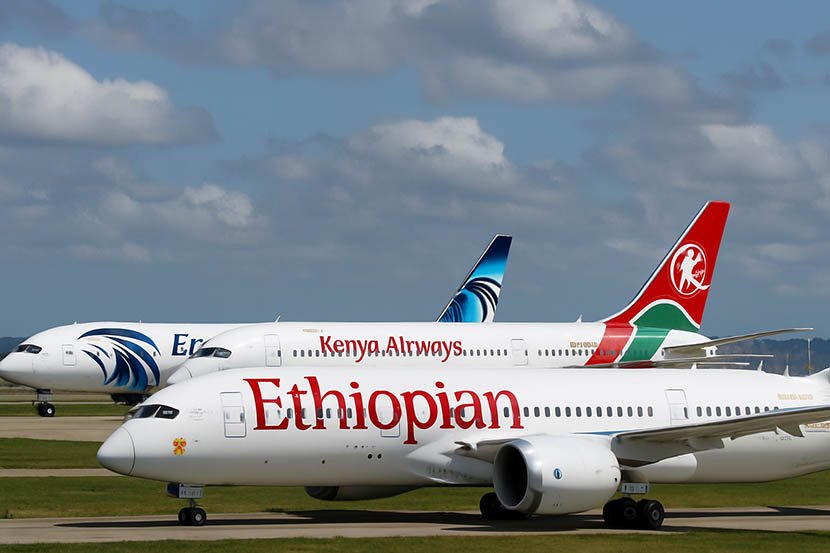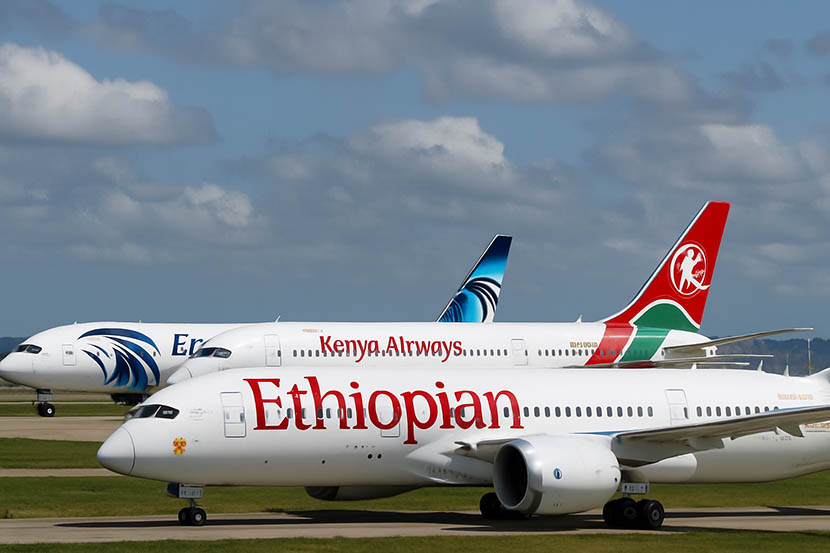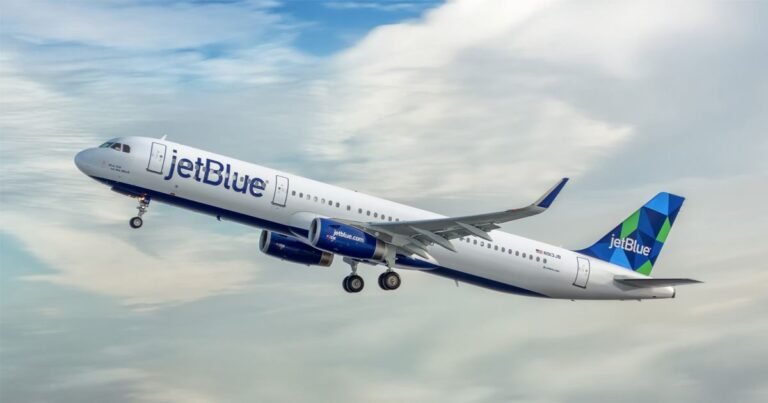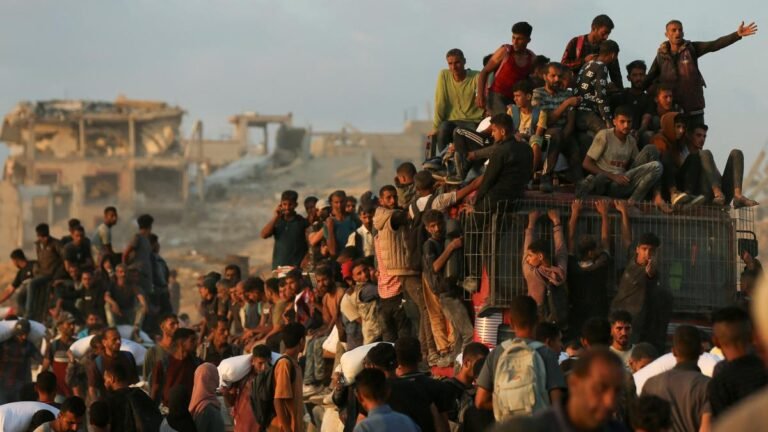
Tuesday, June 17, 2025

US President Donald Trump’s new travel ban is making headlines again—and this time, Ethiopian Airlines, EgyptAir, and Kenya Airways may be in the direct line of fire. What is new in this report? It’s not just the countries involved, but the expanding scope of restrictions that could hit these major carriers hard. The suspense is real. The threat is immediate. Trump’s new travel ban targets 36 additional countries, and now, some of Africa’s biggest airlines—Ethiopian Airlines, EgyptAir, and Kenya Airways—are staring down major operational chaos. With Trump pushing forward fast, the aviation world is bracing for impact. Could key international routes vanish overnight? Will airports scramble to cancel flights? What’s at stake for travelers and tourism industries? These are no longer hypotheticals. This report uncovers what’s changing, who’s vulnerable, and why this new travel ban could strike harder than ever before. Keep reading—this could rewrite the rules of global air travel.
US President Donald Trump’s new travel ban is sending fresh shockwaves through the aviation world—and this time, American Airlines could be among the hardest hit. What is new in this report is not just the list of countries being targeted, but the scale, scope, and suddenness of what’s unfolding. The travel ban isn’t just policy—it’s a direct threat to air travel, border access, and global mobility.
The announcement from US President Donald Trump has triggered growing fear in airline boardrooms and international airports. And now, American Airlines finds itself in the danger zone. What is new in this report? It’s the looming possibility of 36 more countries being restricted—nations that fuel major international flight routes and fill thousands of seats every week.
With Trump’s travel ban already impacting 19 countries, this expansion could turn the aviation sector upside down. Flight schedules may vanish. Routes could be cancelled. Airport terminals may fall silent. Every word in the headline—US President Donald Trump, new travel ban, American Airlines—suddenly carries new weight.
There’s more than meets the eye here. Behind the sharp political move lies a deeper disruption. Baggage systems, loyalty programs, carrier alliances—all face a ripple effect. What’s new in this report is the urgency, the names on the chopping block, and the narrow 60-day window for nations to act.
Trump’s latest crackdown isn’t just aimed at foreign travelers—it’s reshaping the future of American skies. And for American Airlines, the countdown has already begun. Keep reading to uncover how deep this turbulence could go.
Airports and Airlines in the Crossfire: Industry Faces Tumult Amid Expanding US Travel Bans
The implications of President Trump’s proposed expansion of travel bans are reverberating far beyond immigration policy—they are hitting the heart of the global air travel system. For major U.S. international airports and global carriers alike, the threat of barring citizens from 36 additional countries signals the beginning of what could become a logistical, financial, and operational nightmare.
Airport Hubs Could See Disruptions in Passenger Flow
For key international airports such as New York’s JFK, Atlanta’s Hartsfield-Jackson, and Houston’s George Bush Intercontinental, the stakes are sky-high. These hubs rely heavily on steady international traffic to maintain efficiency, profitability, and smooth daily operations. If these bans are enacted, they could see dramatic declines in inbound and outbound traffic from affected nations.
This shift would not be gradual—it could hit terminals almost overnight. Flight manifests would shrink, check-in counters could stand empty, and customs lines could become erratic as travel volume becomes uneven. The ripple effect would strain TSA, Customs and Border Protection, and ground handling crews who depend on predictable flight schedules and passenger flow.
Additionally, airport concessionaires—from food vendors to duty-free retailers—would suffer. Reduced international foot traffic translates into weaker sales, less turnover, and potential layoffs for airport staff who service these global routes.
African and Caribbean Airlines Face Massive Setbacks
For airlines operating out of the African continent and the Caribbean, the news is nothing short of devastating. Carriers like Ethiopian Airlines, EgyptAir, and Kenya Airways could be among the hardest hit. These airlines operate vital routes connecting major African cities with the U.S., facilitating not only tourism but also business and diaspora travel.
If their access is revoked or flight authorizations reduced, the result would be grounded aircraft, lost revenue, and, in many cases, potential route cancellations. These routes are often already operating on thin margins. Losing U.S. connectivity means losing a vital part of their international network.
Airlines with Caribbean ties such as Caribbean Airlines and LIAT may also face reduced load factors and uncertain futures. Many Caribbean nations are included on the proposed list, meaning that travel volumes from their citizens—often visiting family, attending school, or vacationing in the U.S.—could dry up quickly.
American Airlines and Global Partnerships Under Threat
U.S.-based airlines won’t escape unscathed. Many have established international partnerships and code-share agreements with foreign carriers now at risk of being restricted. American, Delta, and United have all invested in global route strategies that include Africa, the Middle East, and Asia-Pacific regions.
With fewer flights allowed from restricted nations, revenue streams will falter. Frequent flyer programs and alliance partnerships, such as Star Alliance and SkyTeam, may also become less attractive. Travelers who rely on these partnerships for intercontinental travel and seamless connectivity could lose access to shared lounges, baggage handling privileges, and reward redemption opportunities.
Logistical Headaches in Interline and Ground Operations
One of the most overlooked consequences of a sweeping travel ban is the disruption to interline ticketing and baggage agreements. Airlines that currently allow passengers to book joint itineraries across carriers—checking baggage through from Nairobi to Los Angeles, for example—will have to unravel those systems.
This could result in misconnected flights, mishandled baggage, and cascading delays. Rebooking stranded passengers or honoring reciprocal agreements becomes an operational burden that eats into carrier profits and customer satisfaction.
Loyalty Programs and Customer Trust at Risk
Frequent travelers may find themselves holding loyalty points they can no longer use effectively. If key destinations become inaccessible, the value proposition of loyalty programs drops significantly. Flyers from affected countries could be left unable to fly or redeem miles, while U.S. travelers might see their global network options reduced.
All of this leads to a growing sense of instability and unpredictability in international aviation. As trust erodes, both leisure and business travelers may shift bookings toward more politically stable corridors, further reshaping travel patterns.
A Shifting Landscape for Global Aviation
In the end, the travel bans don’t just close borders—they slam the brakes on aviation recovery and global mobility. Airlines and airports are now faced with a difficult challenge: pivot quickly or risk being caught in the crosshairs of a geopolitical storm.
As the Trump administration continues to tighten its grip on U.S. borders, the aviation industry watches anxiously. For now, the message is clear—prepare for turbulence.
Trump’s Expanding Travel Ban Sends Shockwaves Through Global Travel and Tourism Industry
The U.S. travel landscape is bracing for another seismic shift. President Donald Trump, known for his hardline immigration stance, is preparing to tighten America’s borders once again—this time eyeing a potential ban on nationals from 36 additional countries. If implemented, this sweeping move could disrupt travel routes, destabilize airline partnerships, and ripple through every corner of the global tourism ecosystem.
Earlier this month, Trump already blocked nationals from 12 countries entirely, while partially restricting access to visitors from seven more. Now, an internal State Department memo has surfaced, revealing an extended list of countries on the brink of joining the exclusion list. These include major African, Caribbean, and Southeast Asian nations—many of which are significant sources of both tourist and business travel to the U.S.
Tourism Industry on High Alert
This proposed expansion threatens to strangle inbound tourism flows at a time when international recovery is still fragile. Countries like Egypt, Ethiopia, Nigeria, Ghana, and Tanzania are not only emerging markets for U.S. travel operators but also home to large diaspora populations. Travel agents, hotel groups, and tour companies now face mounting uncertainty as they await final decisions.
The potential travel ban isn’t just a political move—it’s a massive logistical disruption. Airlines flying from the affected nations may be forced to cancel routes, reconfigure schedules, or abandon market expansion plans. Travel agencies and hospitality operators could lose millions in bookings as traveler confidence collapses.
Airports and Airlines in the Crossfire
For U.S. airports, especially those in major international hubs like New York, Atlanta, and Houston, the implications are enormous. If the bans go into effect, daily operations would see significant shifts in passenger volume, customs procedures, and carrier routing.
Carriers such as Ethiopian Airlines, EgyptAir, Kenya Airways, and others serving Africa and the Caribbean could experience reduced flight authorizations and plummeting load factors. U.S. airlines with code-share agreements or international routes to these countries might see revenue shrink and route profitability questioned.
Moreover, interline ticketing arrangements and baggage transfer systems could be disrupted as fewer carriers are allowed to operate within U.S. borders. Loyalty programs and alliance partnerships may suffer as routes dry up and traveler benefits become limited.
Global Diplomatic Fallout and Border Control Strategy
The proposed ban is rooted in the Trump administration’s claim that these 36 countries have failed to meet a series of vetting and information-sharing benchmarks. These include high visa overstay rates, weak identification systems, and limited cooperation in repatriating deported individuals.
The State Department gave these nations a 60-day window to address the concerns and submit concrete remediation plans. The deadline is rapidly approaching. If they fail, they may face full or partial restrictions that bar their citizens from entering the United States, triggering a fresh wave of diplomatic friction.
This policy echoes Trump’s earlier controversial travel bans targeting mostly Muslim-majority countries during his first term. While those bans were met with legal battles and widespread protest, this new wave is strategically broader—affecting nations from every continent and with wide-ranging economic, cultural, and humanitarian ties to the U.S.
Regional Impact and Human Fallout
The human cost is already building. Students, families, and business travelers from affected countries are left in limbo, unsure if they’ll be able to reunite, study, or invest in the U.S. For example, Egypt—a key Middle Eastern tourism partner—was named in connection to recent security incidents, triggering a fast-track review.
Countries in Africa and the Pacific, including Nigeria, Uganda, Zambia, and Vanuatu, now face severe reputational and economic damage if the ban proceeds. For small island nations like Tuvalu and Tonga, even partial restrictions could devastate niche tourism industries and sever crucial international links.
Meanwhile, nations like El Salvador, Panama, and Costa Rica—praised for cooperating with U.S. deportation efforts—are being positioned as “safe third countries,” highlighting Trump’s transactional immigration strategy.
Business Travel and Student Mobility at Risk
The ripple effect is not limited to leisure travel. Corporate travel programs may face unprecedented setbacks. Multinational firms operating in Africa and Asia now have to reassess mobility plans for staff. Hiring pipelines may grind to a halt, global meetings and conventions may see dwindling international attendance, and visa costs could spike.
International student admissions are also at risk. As Trump sharpens focus on foreign student backgrounds and university affiliations, institutions like Harvard are already under scrutiny. Prospective students from affected countries may lose access to scholarships, research opportunities, or visa renewals.
Urgent Calls for Clarity and Dialogue
Travel advocacy groups, airlines, and tourism boards are demanding transparency and diplomatic dialogue. Industry leaders stress that blanket bans risk damaging years of progress in global cooperation, people-to-people exchange, and market development.
Without clear communication, misinformation spreads rapidly—deterring travelers from even applying for U.S. visas or planning future trips. The mere anticipation of restrictions has already chilled interest among travel operators in West Africa and Southeast Asia.
What Happens Next?
The administration’s message is clear: comply or be cut off. Nations must deliver on vetting upgrades, biometric enhancements, and repatriation agreements—or face the consequences. However, the final decision rests with the U.S. national security agencies, who are assessing each country’s action plans as the clock ticks.
If the bans move forward, they could ignite a wave of retaliation from affected countries. Reciprocal visa restrictions, airline route suspensions, and frozen tourism agreements could follow—undermining not just American tourism, but global trust in U.S. openness.
As the world watches, the travel and tourism sector must brace for a potential flashpoint in international mobility policy—one that could redefine borders, reshape routes, and alter the traveler experience for years to come.
Source: Daily Mail





